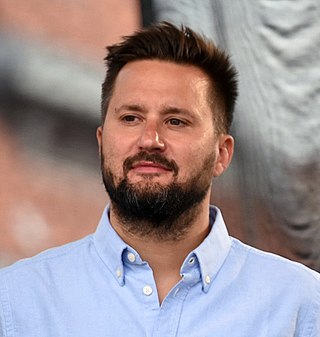Top Qs
Timeline
Chat
Perspective
Matúš Vallo
Slovak politician, current mayor of Bratislava From Wikipedia, the free encyclopedia
Remove ads
Matúš Vallo (born 18 September 1977) is a Slovak politician, architect, urban activist, musician, and the current Mayor of Bratislava. He was elected in 2018 with 36.5% of the vote as an independent politician,[1] and re-elected in 2022 with 60.2% of the vote backed by his own local party Team Bratislava as well as Sloboda a Solidarita and Progresívne Slovensko.[2]
Remove ads
Personal life
Vallo is married with one child.[3] He is the grandson of Miroslav Válek, a former minister of culture for Communist party of Czechoslovakia.[4]
Education
Vallo went to secondary school in Rome, Italy. Being interested in art and geometry, he went on to combine through architecture. Vallo graduated from The Faculty of Architecture at the Slovak Technical University in Bratislava in 2004.[5] Between 2010 and 2011, Vallo received a Fulbright research scholarship to attend Columbia University where he worked on a project called City Interventions at the Columbia Laboratory for Architectural Broadcasting.[6]
Remove ads
Mayor of Bratislava
Summarize
Perspective
2018 Slovak local elections
Vallo was the first candidate to run for Bratislava mayor in the 2018 Slovak local elections.[7] Vallo ran for the post as an independent, but with the help and strong support of non-parliamentary political parties Progressive Slovakia and Spolu[8] backed by a group of experts called Team Vallo who have previously worked on project to improve the quality of life in Bratislava which resulted in a book, Plán Bratislava having been published.[9]
Vallo's main rivals were Václav Mika, the former director of RTVS, the public broadcaster, and the then-mayor Ivo Nesrovnal.[10] During the campaign, he vowed to improve the way the city administration communicates with citizens, make processes more transparent and engage more with the residents.[11][12] Vallo criticised then-mayor Nesrovnal for his inability to come to agreement with the members of the city council, leading to the deadlock in implementing the new parking policy, stagnating improvement of the cycling infrastructure and other issues.[13][14][15] He was officially sworn into office as Bratislava's mayor on 7 December 2018.[16]
Transport and parking policies
One of the first[17] policies Vallo started to work on was the parking policy delays with the implementation of which he has previously criticised[13] his predecessor for. His aim was decide on the framework the city borough and the city council will build upon, in the first half of 2019[18] The original proposal included residential parking zones in locations decided by the city boroughs.[19]
The proposal caused some backlash, after which some changes had been made.[20] The cost of the yearly parking card was reduced to €39; additional €10 a year allow parking in other boroughs for a maximum of two hours.[21][22] In October 2020, the launch of the parking policy was announced to be delayed until autumn 2021.[23]
Metropolitan Institute of Bratislava
Vallo initiated the establishment of the Metropolitan Institute of Bratislava.[24] The Metropolitan institute of Bratislava has developed the manifest and the manual for public spaces.[25]
Planning permissions review
Under Vallo, the review of planning permission became stricter, with more projects being rejected for ignoring or bypassing requirements.[26][27][28]
Public space revitalisation and greenery initiatives
In 2018, three central squares — SNP Square, Velvet Revolution Square and Kamenné Námestie — were redesignated as a unified pedestrian-priority zone under the accompanying Živé námestie (‘Vivid Square’) project, incorporating climate‑adapted green infrastructure and public seating based on a German architectural winning proposal announced in April 2019. The three squares, covering nearly 35,000 m², represent the largest public‑space redevelopment initiative in Bratislava since the 1970s.[29][30]
In late 2020, the city pledged to plant 10000 new trees across urban areas, addressing air quality, shading, biodiversity and stormwater retention—underscoring Vallo’s emphasis on sustainable urban greening.[31]
In 2021, Vallo’s administration initiated the Živé miesta (‘Vivid places’) scheme[32], earmarking €14.3 million to renovate more than 25 public spaces across Bratislava, including parks on Žilinská, Krížna–Karadžičova, Legionárska, Husova, Dunajská and the under‑bridge area beneath SNP Bridge — to improve urban greenery, accessibility and neighbourhood quality. [30] Early completed projects under Vivid Places included a small park on Židovská (so-called ‘pocket park’), seating and greenery improvements on Štúrova, and low-cost ‘quick fixes’ on Klobučnícka and Treskoňova featuring potted trees, seating, and greening interventions, designed for short completion time and compatibility with future comprehensive redesigns[33].
Other
Along with the capitals of the other Visegrád Group countries, Vallo signed the Pact of Free Cities to promote "common values of freedom, human dignity, democracy, equality, rule of law, social justice, tolerance and cultural diversity".[34] Vallo supports the Bratislava Pride and has attended it both during his mayoral term and before.[35]
Remove ads
References
External links
Wikiwand - on
Seamless Wikipedia browsing. On steroids.
Remove ads

